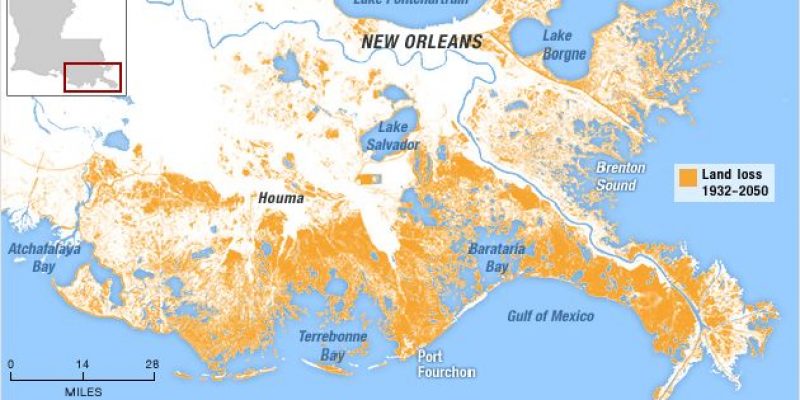Coastal lawsuits solely aimed at oil and gas companies in Louisiana do more to harm the state’s and the nation’s oil supply and economy at the expense of taxpayers, thousands of lost jobs, and other long-lasting effects, two coastal parish presidents and other members of the Grow Louisiana Coalition contend.
In 2013, some local governments in Louisiana sued more than 200 oil and gas companies, seeking compensation for damages they claimed the companies caused to the region’s wetlands. Coastal lawsuits such as those filed in Louisiana do not exist anywhere else in the country.
Terrebonne Parish President Gordon Dove and Lafourche Parish President Archie Chaisson have fought against the lawsuits, arguing they are “money grabs” made by trial lawyers that have nothing to do with environmental preservation. Both parish presidents have pledged to never sue an oil and gas company as long as they are in office.
“These lawsuits don’t make sense … for Louisiana as a whole,” Chaisson said. “They are a farce.”
Dove and Chaisson participated in a new online webinar series organized by the Grow Louisiana Coalition. The webinar brought together industry leaders and state and federal lawmakers who discussed how the energy industry is critical to the state’s economy and to Louisianans’ way of life.
U.S. Rep. Steve Scalise, state Sens. Bret Allain and Mike Fesi also participated. The Louisiana Oil & Gas Association, Louisiana Mid-Continent Oil & Gas Association, Gulf Economic Survival Team and many other associations also participated or supported the efforts to launch the series.
Chaisson, a former coastal zone manager and administrator in the parish who has worked to preserve the region’s economic and environmental viability, said that 2020 was the first year the parish built more land than it lost. They’ve been committed to preserving their coastal wetlands but also to ensuring the growth of the oil and gas industry.
Dove, who previously served in the state legislature, has been involved in the oil industry since 1980. In Terrebonne Parish, 65 percent of the land is owned by the oil and gas industry.
In Lafourche Parish, more than 250 companies use Port Fourchon as their base of operations. In addition to its huge domestic hydrocarbon significance, Port Fourchon is the land base for LOOP (Louisiana Offshore Oil Port), which handles between 10 and 15 percent of all domestic oil in the U.S. and 10-15 percent of the nation’s imported oil.
LOOP is also connected to 50 percent of the U.S. refining capacity. More than 400 large supply vessels go through the port’s channels every day.
Port Fourchon currently services over 90 percent of the Gulf of Mexico’s deepwater oil production, and plays a strategic role in providing the U.S. with roughly 18 percent of its entire oil supply. More than 1.5 million barrels of crude oil per day are transported via pipelines through the port.
Deepwater fields produce some of the highest oil rates in the Gulf of Mexico, which are significantly higher off the southeastern Louisiana coast.
Over 45 percent of total U.S. petroleum refining capacity and 51 percent of total U.S. natural gas processing plant capacity are located along the Gulf Coast.
The Gulf of Mexico alone provides the U.S. with roughly one-fifth of its domestic oil supply.
Scalise said before COVID-19 hit, the U.S. “had the most energy-dominant industry in the world. And a lot of that success in energy dominance was because of what’s done in Louisiana. So much of the global innovation comes from the great engineering and innovative minds that we have in south Louisiana. This is something we have been doing for decades and generations.”
The Gulf region, including Texas, Louisiana, Mississippi, Alabama and Florida, and federal offshore drilling in the Gulf of Mexico, produces nearly 40 percent of total U.S. crude oil and 35 percent of total U.S. natural gas.
Because of what Louisianans and others in the Gulf have done, Scalise argued, “America has never been more secure in terms of ability to produce our own energy, to lower energy costs to families, and to start sending energy all around the world.”
That’s one of the many reasons why both Chaisson and Dove oppose the lawsuits.
Referred to as “jackpot justice,” trial attorneys have cashed in, or are attempting to cash in, on billions of dollars from energy companies that are legally conducting production activities that were encouraged by state incentives and carried out under rigorous state and federal regulations, Melissa Landry, a longtime advocate arguing for legal reform in the state, said.
According to a recent Pelican Institute analysis, coastal lawsuits have directly cost Louisiana’s economy between $44 million and $113 million every year since they were first filed in 2013. The lawsuits resulted in at least 2,000 jobs lost and roughly $70 million in lost earnings for Louisianans.
Offshore drilling declined by more than 50 percent since 2013, resulting in a loss of $22.6 million per year in royalties that would have otherwise been paid to the state and local governments.
Advertisement
Advertisement

